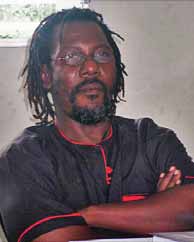|

Professor Jean Anil Louis-Juste
inspired his students and other
progressives working for social
change in Haiti
Along with the earthquake, another
terrible event occurred on January
12. Gunmen assassinated in broad
daylight Jean Anil Louis-Juste, a
beloved teacher at the State University’s
School of Human Sciences and
Ethnology. No investigation has yet
been launched into the killing, which
occurred shortly before the massive
quake. This report about Anil’s memorial
service from Haiti Liberté’s
Port-au-Prince bureau chief Yves
Pierre-Louis conveys the deep infl uence
Louis-Juste had on many Haitian
students and progressive activists.
His killing now takes its place
among many other unsolved murders
of progressive fi gures in Haiti
including educator Charlot Jacquelin
(1986), journalist Jean Dominique
(2000), Father Jean Marie Vincent
(1994), and Father Ti Jean Pierre-
Louis (1999). The article was translated
from its original Kreyòl by Kim
Ives.
On Friday, Mar. 12, 2010, two
months to the day after his
death, several hundred students,
professors, revolutionary militants,
peasant representatives, and delegations
from the U.S., Cuba and the
Dominican Republic gathered in the
yard of the School of Human Sciences
to pay their last respects to a
comrade, a university professor, a
revolutionary, Jean Anil Louis-Juste.
On Jan. 12, about two hours
before the earthquake, criminals
dispatched by shadowy reactionary
forces assassinated Anil. They shot
him three times, and he died later in
the hospital. He was killed for speaking
the truth, fi ghting lies, taking
courageous positions and defending
the masses’ interests while working
at the State University of Haiti
(UEH).
Who was Anil Louis-Juste?
He was 53 years old, had studied
agronomy, and had lots of diplomas.
He had also studied sociology
and had obtained a doctorate in sociology
from the University’s School
of Human Sciences and Ethnology.
He had always taught his courses
in Kreyòl, the Haitian people’s language,
so that his ideas would fi nd
purchase among the masses and
change the way they think and act.
He always fought for the people’s
cause. He refused all bourgeois privilege
so that he could remain true to
his convictions.Anil helped to set up several
student organizations including the
Association of Dessalinien University
Students (ASID), the Movement
for Popular Democracy (MODEP),
and the Gramsci Circle.
In a leafl et that was circulated
at the memorial service, the Student
Group to Refl ect on Social Problems
(GREPS) said: “Professor Anil, we
will never forget you. They killed
your body but liberty’s wind blows
more strongly in our hearts, and
what you planted in us will continue
to fl ower.”
In a special issue of the revue
Dessalinien (January/February
2010) entitled “Tribute for a Dessalinien
Liberator, Jean Anil Louis-
Juste,” ASID published a piece which
Anil wrote on Jan. 5, 2009 entitled
“Social Communication and Social
Questions in Haiti: What Practice of
Refl ection and Refl ection of Practice
is there at the School of Human Sciences?”
“There is a tendency in Haiti
for people to associate social communication
with journalism,” he
wrote in the piece. “When one talks
about communication, people think
of radio, newspapers, television, etc.
If we could only communicate via
the mass media, there wouldn’t be
any communication. When we look
at the news media’s programs, we
fi nd that they give the politicians’
messages priority over every other
aspect of life. But it isn’t a political
message. It is the message of opportunists
only fi ghting to occupy a
state post. At the same time, journalists
give the heads of ‘civil society
organizations’ to right to construct
new forms of the State, even though
civil society wants to present itself
as not having any State affi liation.
It is only momentous social events
when the mainstream press allows
union leaders, popular organization
leaders and peasant movement
coordinators to talk. This practice
makes even journalists think that
it’s only civil and political politicians
who are the source of news, in
other words who can make an event
important, who make sense and
who interest the public the media is
trying to reach. Furthermore, when
they have to comment on a government
decision, they grab a civil or
political politician and put him or
her before the people to give their
opinion. Usually they speak on behalf
of the political class in the opposition.
The journalists don’t even
consider that they themselves have
the right to have their own opinion
on the measures the State or civil
society are taking in society. This
practice makes social communication
become still poorer. It is presented
in two dimensions: its length
is “political,” its width is media. If
others speak of communications,
they ask : ‘what authority do you
have to refl ect on social communication.’” |